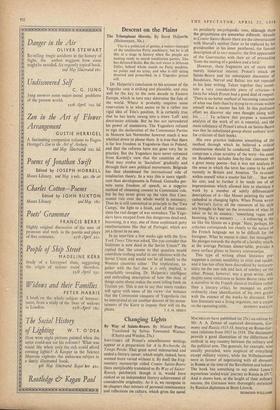Descent on the Plains
The Triumphant Heretic. By Ernst Halperin. (Heinemann, 30s.) Tito is a politician of genius, a master-manager of the totalitarian Party machinery, but he is all this at a stage in history when the people are making ready to smash totalitarian parties. Tito has defeated Stalin. But the real victor is Milovan Djilas, behind whom stands no Party machine, no police and no army, and who is still sitting deserted and proscribed, in a Yugoslav prison cell.
Dr. Halperin's conclusion to his account of the Yugoslav case is striking and plausible, and may well be the key to the next decade in Eastern Europe, which in turn may determine the fate of the world. Where it probably requires some reservation is in what seems to be a rather too rigid idea of Tito's position. It is certainly true that he has lately swung into a more 'Left' and doctrinaire attitude. But he has not surrendered his power of manoeuvre. The Yugoslays refused to sign the declaration of the Communist Parties in Moscow last November however much it was whittled down to please them. It is true that there is far less freedom in Yugoslavia than in Poland, and that the reforms have not gone very far in practice. But the Yugoslays have never retreated from Kardelj's view that the countries of the West may evolve to 'Socialism' gradually and through their own political movements. Belgrade has thus abandoned the international side of totalitarian theory. In a way this is more signifi- cant than developments in Poland. Gomulka per- mits some freedom of speech, as a supsior method of obtaining consent to Communist rule, but he has never given up the view that Com- munist rule over the whole world is necessary. Thus he is still committed in principle to the 'Two Camps,' the fight to a finish, and all that consti- tutes the real danger of war nowadays. The Yugo- slays have escaped from this dangerous dead-end, becoming, in a way, one of those unpleasant petty totalitarianisms like that of Portugal, which are yet a threat to no one.
In an interview a few weeks ago with the New York Times Tito was asked, 'Do you consider that Stalinism is now dead in the Soviet Union?' He replied that 'the answer to that question would contribute nothing useful to our relations with the Soviet Union and would not be of benefit to the Western countries either.' The implication, to- gether with the fact that it is only implied, is remarkably revealing. Dr. Halperin's intelligent and enthralling description of how this state of things came about makes the most telling book on Titoism yet. This is not to say that many readers will agree with some of his views—for instance that the communist conquest of Yugoslavia can be interpreted as yet another descent of the moun- taineers of the Karst to impose their will on the














































 Previous page
Previous page